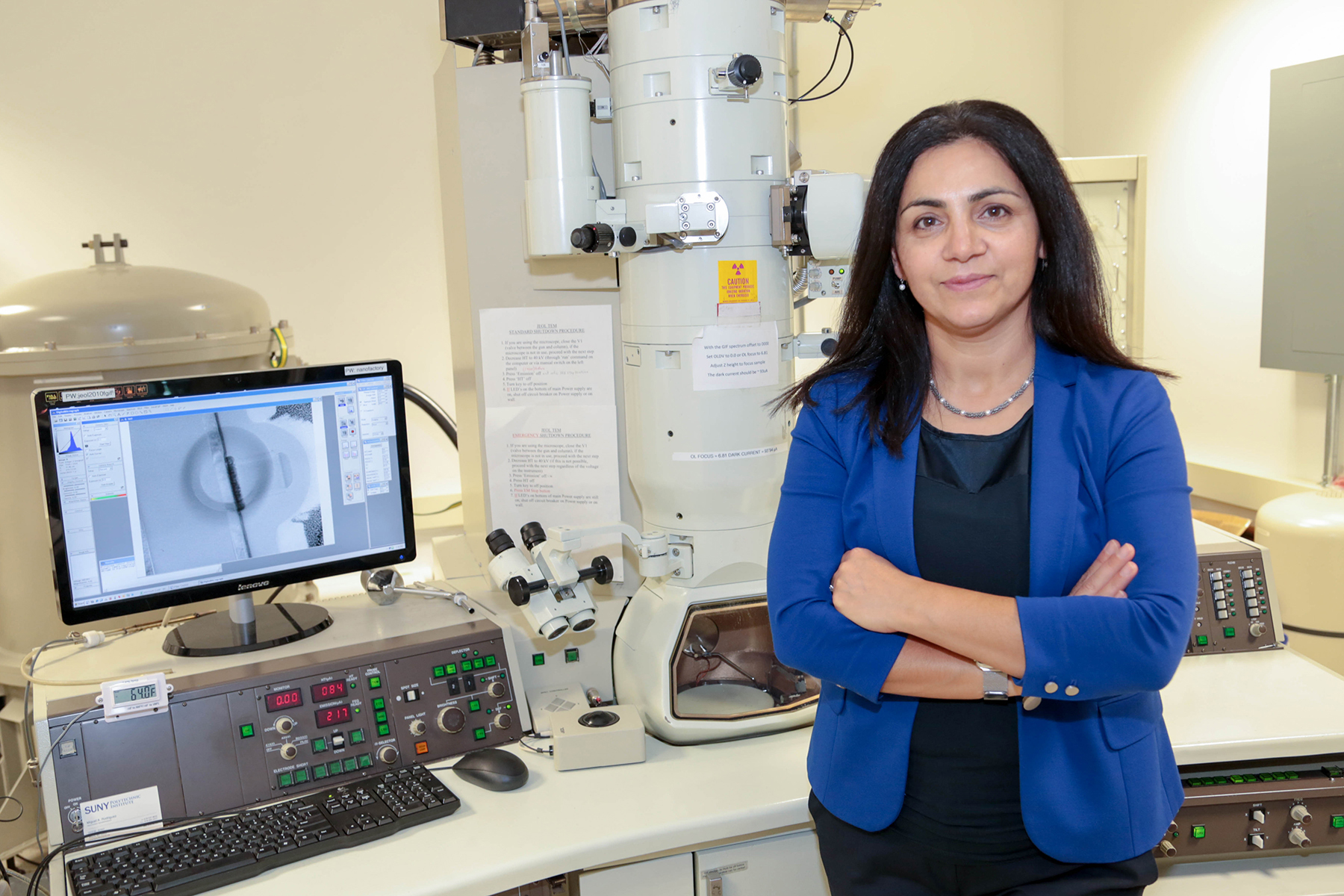As nanoengineering professor and interim dean of graduate studies at SUNY Polytechnic Institute (SUNY Poly), Dr. Fatemeh (Shadi) Shahedipour-Sandvik’s research aims to improve electronic devices by fabricating them with the right characteristics to work well even in the harshest environments, such as in space or inside a jet engine. Shahedipour-Sandvik and her team are able to make specific changes to semiconductors, the platform for electronic circuitry, and do so at the molecular level. This ability may lead to next-generation technologies used in everything from space travel to the energy grid.
“Semiconductors are fascinating,” Shahedipour-Sandvik said in a recent SUNY RF interview. “Especially the novel materials we’re working with; it’s a really amazing material system because of the unique and extreme properties it offers. My lab at SUNY Poly is able to develop and analyze the best combination of materials to enhance the exact properties we are seeking—it’s a testament to the resources available at this campus.”
Falling in the middle of the conductive/insulator “spectrum,” semiconductors can be switched “on” or “off.” This means they can be useful as the foundation of electronic devices, such as for chips that make up the now ubiquitous cell phone. By using more robust materials, power electronics chips can be used in hotter or more extreme environments.
Shahedipour-Sandvik earned her Ph.D. researching semiconducting diamonds at the University of Missouri. She has continued to explore ways to further advance semiconductors. Beginning her work at SUNY Poly in 2001, her research efforts have been recognized by the institution and the state. She has received numerous awards, including the 2006 Rising to Lead Best Technologist Award from the city of Albany’s Alliance of Technology and Women, and a 2012 Excellence in Research award from the University at Albany. The Research Foundation for the State University of New York also named her as its first Presidential Fellow for the 2013-14 academic year.
Shahedipour-Sandvik has received significant funding for her research. Along with colleagues, she was most recently awarded $720,000 by the U.S. Department of Energy’s Advanced Research Projects Agency-Energy (ARPA-E) for the study of cutting-edge semiconductors, based on gallium nitride (GaN) that can be more useful in high power electronics than the typical silicon (Si).
“In comparison to silicon, GaN can be used to create devices that work in some of the harshest environments,” Shahedipour-Sandvik said. GaN-based devices have properties that are able to minimize electronic “noise” that can appear in silicon semiconductors under extreme conditions; such noise results from unwanted current that continues to flow when the semiconductor should be in an “off” state. This can happen when the environment compromises the device’s function. “These characteristics mean that not only does GaN have fascinating properties, but the system holds great promise for technological advances,” she said.
Working with collaborators from SUNY Poly, the Army Research Lab, Drexel University, and Gyrotron Technology, Inc. (Gyrotron), Shahedipour-Sandvik hopes to overcome one of the major challenges in creating these next-generation devices: effective and selective p-type doping in the GaN base. Semiconductors consist of a lattice of atoms—like silicon, or gallium and nitrogen for GaN—with different elements incorporated into the lattice through a process called doping, which can help control current flow based on the element that is added. By creating these “imperfections” in the lattice of GaN, the semiconductor device is able to better withstand extreme environments.
Shahedipour-Sandvik said, “With this most recent grant, I am proud that the U.S. Department of Energy’s ARPA-E has recognized our leading-edge power electronics-focused research, which has the potential to drive innovation for practical applications that could lead to worldwide energy savings. Advanced power electronic devices offer significant advances in power density, efficiency, and reduced total lifecycle cost. This grant allowing our SUNY Poly team and partners at the Army Research Lab, Drexel University and Gyrotron Technology, Inc. to explore advanced doping and annealing techniques for gallium nitride-based power devices is a great example of how SUNY Poly’s resources and leadership in areas like power electronics can help power the future in exciting and meaningful ways.”
In this case, corporate partner Gyrotron is working with Shahedipour-Sandvik on a new method for activating the dopant, magnesium, which is introduced through a process called implantation. More specifically, they are using microsecond pulses of electromagnetic waves so that the GaN base temperatures may be increased to over 1,300 degrees Celsius. The team aims to get high levels of doping without harming the GaN lattice.
While GaN bases are expensive and not as readily available as the more typical Si platform, Shahedipour-Sandvik thinks that GaN will play an increasing role in the technologies that are improving society. “Even if these devices are made on small areas in low volume, they’re still going to be very impactful,” she said.
